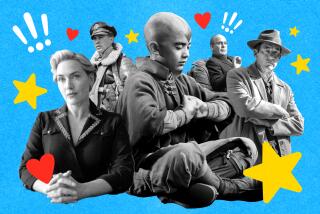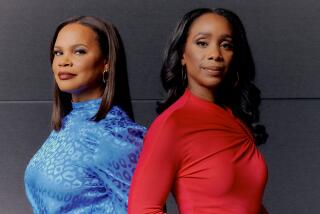Facetime: CW’s Dawn Ostroff on the launch of the network’s fifth season
This week, the CW network launches its fifth season — a feat that some in the television industry once thought improbable. The network will air 10 hours a week of original prime-time programming, including two high-kicking new entries: “Nikita,” a drama about about a rebellious spy, and “Hellcats,” a show about a young woman trying to pay for college with a cheerleading scholarship.
In its four-year uphill slog in an increasingly fragmented media world, Burbank-based CW has made substantial gains, though it is not yet profitable. CW has, however, created significant revenue for parent companies CBS and Time Warner’s Warner Bros. through international distribution, syndication and DVD sales of CW shows. The network has also tapped the vein of youth culture, setting fashion trends with shows such as “Gossip Girl,” “90210” and “The Vampire Diaries.” Despite modest ratings the network sold about $380 million in commercial time for the upcoming TV season.
We caught up with Dawn Ostroff, entertainment president, to discuss the challenges and rewards.
What were some of the tough lessons that you had to learn?
We learned how hard it is to launch a new network. The marketplace is cluttered and we are in the middle of a digital revolution. Here a new network came along that had to change its entire TV station affiliate body. People who used to watch the WB on a certain channel had to change the channel to watch their shows. The UPN people who had to find their shows on different channels. It was a very big undertaking, much larger than what everybody realized. It is probably the last broadcast network that will ever be built.
How did you decide which viewers to target?
We looked at the landscape and said, where is the white space and how can we carve out a niche for ourselves, not only for viewers and affiliates, but also for advertisers. Why would they need to buy CW? Early on, I remember telling people we were building this new network, CW. Nobody had ever heard of it. Some thought it meant country and western. It stands for CBS and Warner Bros. It was a challenge to just get CW recognized by people. In four short years, we have accomplished a lot in terms of creating a network that people now know, creating a clear brand and creating programs that have become part of our cultural vernacular.
There was some speculation that people under 35 were interested only in reality shows. How have you gotten traction for scripted programs?
People want to see themselves reflected on television, or an aspirational version of themselves. And one of the secrets about CW is that, although we appeal to young viewers, the median age of our audience is 33. And although we target a core audience of women 18 to 34, more than a third of our audience is men. The economy has had a tremendous effect on our audience. Some of them grew up in an environment where they felt entitled and everything was relatively easy. And for the first time they have come face-to-face with some difficulty. Some kids were graduating from college and they couldn’t get a job. Others had gotten jobs but were the first ones fired. We have also found that people wanted shows they could escape in, such as “The Vampire Diaries,” which became our No. 1 show at the network.
How are you using the Internet as a complement to the TV — and not a competitor?
I have always said we are a bit of the canary in the coal mine. Our young viewers are showing us what the future is. We have tried to be at the forefront of using the latest technology and communicating with the online audience. We are not on Hulu, you cannot legally get our shows anywhere but cwtv.com. This year, we are putting [more] commercials in our online episodes. It has given us an opportunity to make a significant amount of additional revenue. This could serve as a blueprint for the networks. We also have developed a measurement system to determine the demographics of the people who are watching online, which is something new.
When CW launched, some predicted it would be immediately profitable, but that hasn’t happened. Is it enough to provide revenue for the parent companies through program sales, syndication and DVDs?
When you look at several of the networks you see that they don’t necessarily make the money that you would think. It is the assets that really make the money. That’s part of why so many of these networks own their own TV studios. When you look at what we make for our parent companies, it certainly is big in the plus column.
Which new CW character are you more like, “Nikita” or the girl from “Hellcats”?
Definitely the “Nikita” character. Our business is getting tougher all the time. You need to be aggressive, strategic, insightful and you need to have your priorities and your goals very clear. The Nikita character has all of that. She has a real purpose, a real goal, she is strategic and smart and she gets what she wants.
More to Read
The biggest entertainment stories
Get our big stories about Hollywood, film, television, music, arts, culture and more right in your inbox as soon as they publish.
You may occasionally receive promotional content from the Los Angeles Times.











